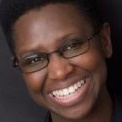Diversity Manager Lenna Cumberbatch discusses work on the Society's Diversity Strategy.

My work at the Royal Society over the past couple of years has been in contributing to and delivering on the Society’s Diversity Strategy. Whilst creating and nurturing an inclusive culture at the Society with our internal diversity working group and the development of our unconscious bias briefing and animation a lot of work has focused on groups underrepresented in science, technology, engineering and mathematics (STEM).
We have developed a variety of programmes, initiatives and activities over the past few years. Our video series Inspiring Scientists tells the stories of ten black and minority ethnic scientists. I wasn’t always a scientist features scientists who took non-traditional routes into their scientific careers.
We undertook a digital campaign to support the launch of Parent Carer Scientist, our resource celebrating the diversity of work life patterns of 150 scientists across the UK with the aim of increasing the visibility of people combining a career in science with a family life.
Destination STEMM is a mentorship programme for young black students studying science with the aim of encouraging them to continue studying and working in STEM.
Out in STEM, our annual event to celebrate LGBT History Month was a next step in creating an inclusive culture in STEM environments.
Beth Hellen founded the LGBT STEM blog which held it’s first LGBT STEMinar in 2016 and a second in 2017.
“I looked around and realised that in my field, and the institutions I worked in, I was better known for being a rare outspoken lesbian than I was for my research.
“It was slow work at first, getting the word out about the project and persuading people that they wanted to publicly out themselves as an LGBT+ person working in STEM. When approaching people, I had a whole lot of noes and also a couple of yeses that subsequently became noes. But much more importantly, I’ve had a huge number of emails from people saying how important the project was for them, that it helped them to feel more connected and less alone.”
The message of being alone is one we see repeated throughout our work in diversity where underrepresented groups feel isolated and alone. This was the key message that came out of our first Out in STEM event in 2016, not knowing if who you worked with was also LGBT+ or seeing senior LGBT+ staff making you feel like you could progress in your career.
“I wanted to meet some of these people in real life. I thought I could probably find a dozen people who would be interested in meeting up, so I floated the idea on Twitter and a resounding yes came back! That dozen people I’d envisioned meeting up for a drink and a chat turned into the 90 people who registered for the first LGBTSTEMinar, a full day of research and outreach talks and a whole lot of networking. A year went by and the 2nd LGBTSTEMinar happened, with 144 people registered this time. It was as much of a success as the first one, with greater diversity in talks and attendees.”

